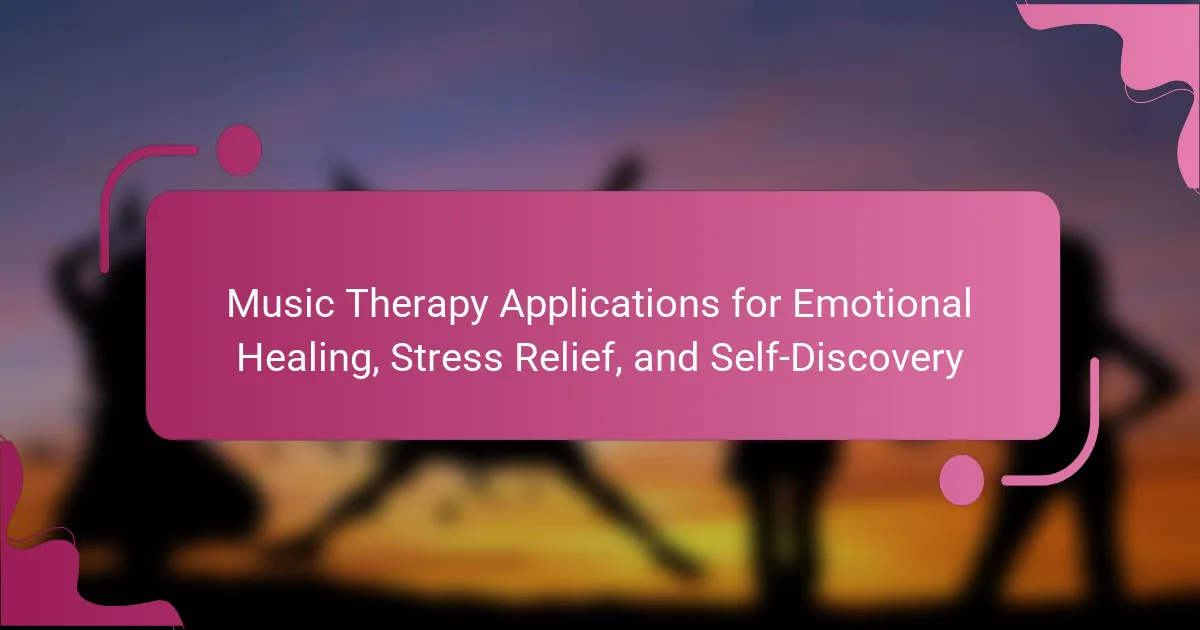Music therapy offers significant benefits for emotional healing, stress relief, and self-discovery. It facilitates emotional expression and enhances awareness, while also promoting relaxation and reducing anxiety. Techniques like songwriting and guided listening support personal insight and emotional resilience. Addressing challenges in access and integration can further enhance its effectiveness in therapeutic settings.
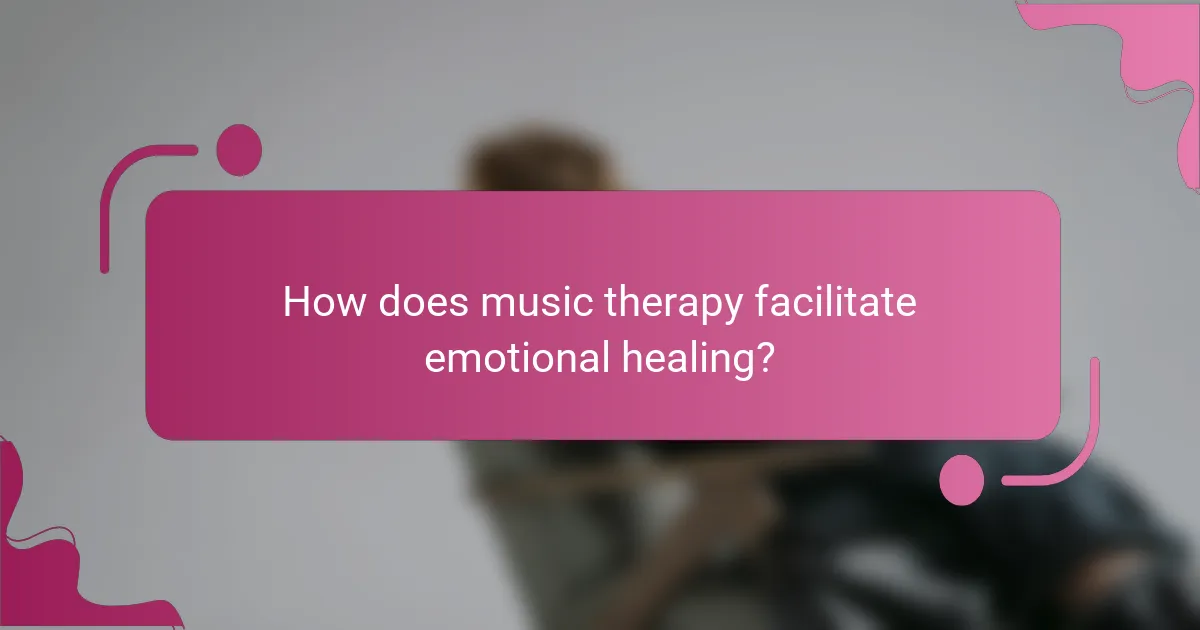
How does music therapy facilitate emotional healing?
Music therapy facilitates emotional healing by using music to express feelings and process trauma. It enhances emotional awareness, reduces stress, and promotes self-discovery. Through active participation, individuals can explore their emotions in a safe environment. This therapeutic approach can lead to improved mental health outcomes and emotional resilience. Techniques include songwriting, improvisation, and guided listening, which help individuals articulate feelings that may be difficult to express verbally.
What are the psychological benefits of music therapy?
Music therapy provides significant psychological benefits, including emotional healing, stress relief, and enhanced self-discovery. Research indicates that it can reduce anxiety levels and improve mood by facilitating emotional expression. For example, participants often report increased self-awareness and improved coping skills through engaging with music, whether by listening or creating. Additionally, music therapy can foster social connections, offering a supportive environment for individuals to share experiences and emotions. These benefits contribute to overall mental well-being, highlighting music therapy’s role as a valuable therapeutic intervention.
Which techniques are most effective for emotional healing?
Music therapy techniques such as guided imagery, active music-making, and songwriting are effective for emotional healing. These methods promote self-expression, reduce stress, and enhance self-discovery.
Guided imagery uses music to evoke mental images, fostering relaxation and emotional release. Active music-making encourages participation, helping individuals process emotions through rhythm and melody. Songwriting allows for personal storytelling, facilitating introspection and healing.
Research shows that music therapy can lower anxiety levels by 50% and improve mood significantly. These techniques uniquely cater to individual emotional needs, making them versatile for various therapeutic contexts.
How do personal experiences shape the effectiveness of music therapy?
Personal experiences significantly enhance the effectiveness of music therapy by fostering emotional connection and personal resonance. Individual backgrounds influence how clients relate to music, shaping their therapeutic journey. For instance, someone who associates a particular song with a positive memory may find it more effective in evoking emotions during therapy. Additionally, personal experiences can guide therapists in selecting appropriate music, tailoring sessions to meet unique emotional needs. This customization enhances engagement, leading to improved outcomes in emotional healing and self-discovery. Overall, the integration of personal experiences into music therapy creates a more meaningful and impactful process.
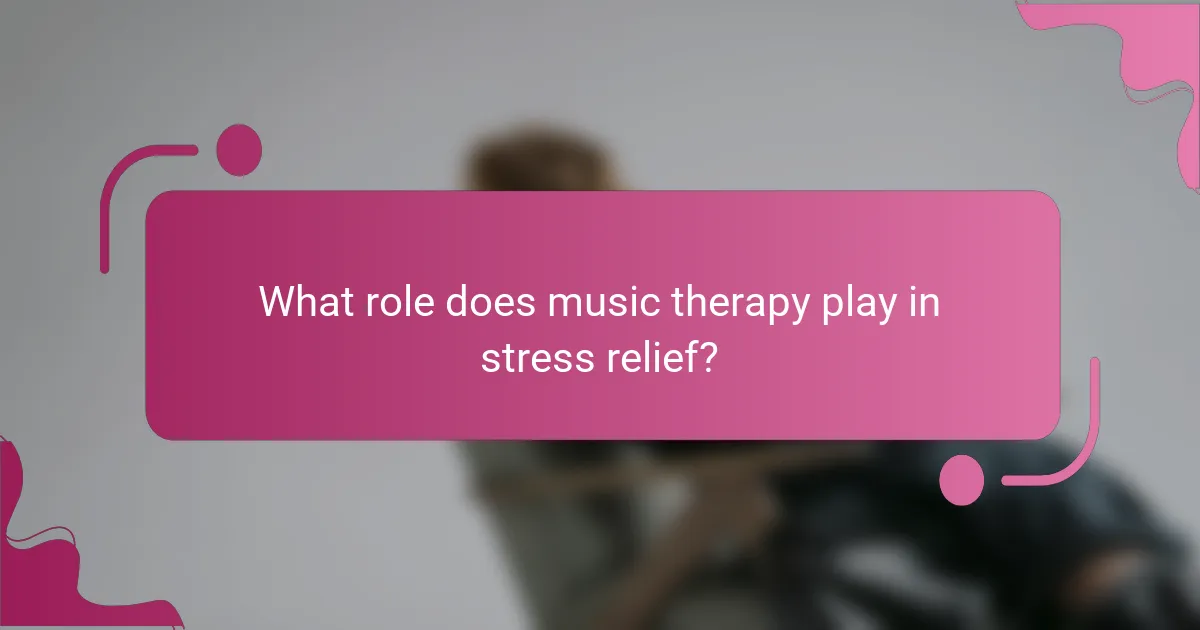
What role does music therapy play in stress relief?
Music therapy significantly aids in stress relief by promoting relaxation and emotional expression. It utilizes music to lower anxiety levels, enhance mood, and improve overall well-being. Research indicates that engaging with music can decrease cortisol, a stress hormone, leading to a calmer state of mind. Additionally, music therapy fosters self-awareness and personal insight, which are essential for emotional healing. Techniques such as guided imagery with music and active music-making can facilitate these benefits, making it a versatile tool for stress management.
Which music therapy methods are best for reducing anxiety?
Music therapy methods that effectively reduce anxiety include guided imagery, active music-making, and mindfulness-based approaches. These techniques promote relaxation and emotional expression.
Guided imagery involves using music to evoke mental images that foster relaxation. Active music-making encourages participation, allowing individuals to express feelings and reduce tension. Mindfulness-based approaches combine music with meditation, enhancing self-awareness and emotional regulation.
Research shows that these methods significantly lower anxiety levels, making them valuable tools in therapeutic settings.
How does music influence physiological stress responses?
Music significantly reduces physiological stress responses by lowering heart rates and cortisol levels. Studies show that listening to music can activate the parasympathetic nervous system, promoting relaxation. This effect is particularly evident in music therapy, which uses tailored musical interventions to address emotional distress. Research indicates that participants in music therapy report lower anxiety levels and improved mood, demonstrating its effectiveness in stress relief.
What are the long-term effects of music therapy on stress levels?
Long-term music therapy significantly reduces stress levels, enhancing emotional well-being. Studies show that consistent engagement in music therapy leads to lower cortisol levels, improved mood, and greater resilience to stress. Participants often report lasting benefits, including improved coping strategies and emotional regulation. Furthermore, music therapy fosters self-discovery, aiding individuals in expressing feelings and experiences that contribute to stress reduction.
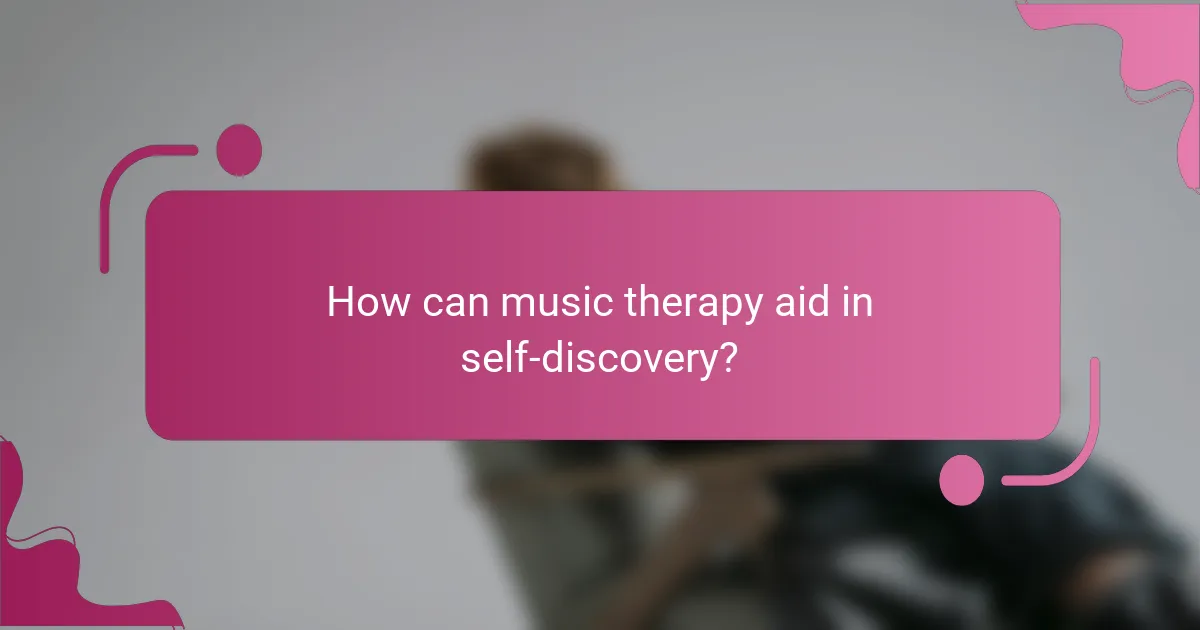
How can music therapy aid in self-discovery?
Music therapy aids in self-discovery by facilitating emotional expression and enhancing self-awareness. It uses music as a tool to explore feelings, thoughts, and personal experiences. Through improvisation and songwriting, individuals can uncover hidden emotions and gain insights into their identities. Engaging with music fosters a safe space for reflection, allowing for deeper understanding of personal challenges and aspirations. Research indicates that music therapy can lead to improved emotional regulation and resilience, supporting the journey of self-discovery.
What are the pathways through which music therapy enhances self-awareness?
Music therapy enhances self-awareness through emotional expression, reflective listening, and mindfulness practices. Engaging with music allows individuals to explore their feelings in a safe environment. This process promotes self-reflection, helping clients identify emotions and thoughts that may be unrecognized. Additionally, music therapy can facilitate deeper connections to personal experiences, fostering insight into one’s identity and emotional landscape. As a result, participants often report increased clarity and understanding of themselves.
Which music genres are most effective for self-exploration?
Genres like ambient, classical, and folk music are most effective for self-exploration. Ambient music promotes relaxation, creating a safe space for introspection. Classical music, with its complex structures, can evoke deep emotional responses, aiding in self-discovery. Folk music often tells stories that resonate personally, encouraging reflection on life experiences. These genres facilitate emotional healing and stress relief, making them ideal for therapeutic applications.
How do cultural differences influence self-discovery through music therapy?
Cultural differences significantly shape self-discovery through music therapy by influencing emotional expression and therapeutic outcomes. For instance, various cultures have unique musical traditions that affect how individuals relate to music and use it for healing.
In some cultures, collective music-making fosters community and shared experiences, enhancing personal insights. Conversely, cultures with strong individualistic values might emphasize personal reflection in music therapy, leading to different self-discovery pathways.
Furthermore, cultural norms dictate emotional expression, impacting how individuals engage with music therapy. In cultures where emotional restraint is common, participants may initially struggle to express feelings through music, affecting therapeutic progress.
Overall, understanding these cultural nuances allows therapists to tailor music therapy approaches, promoting effective emotional healing and deeper self-discovery.
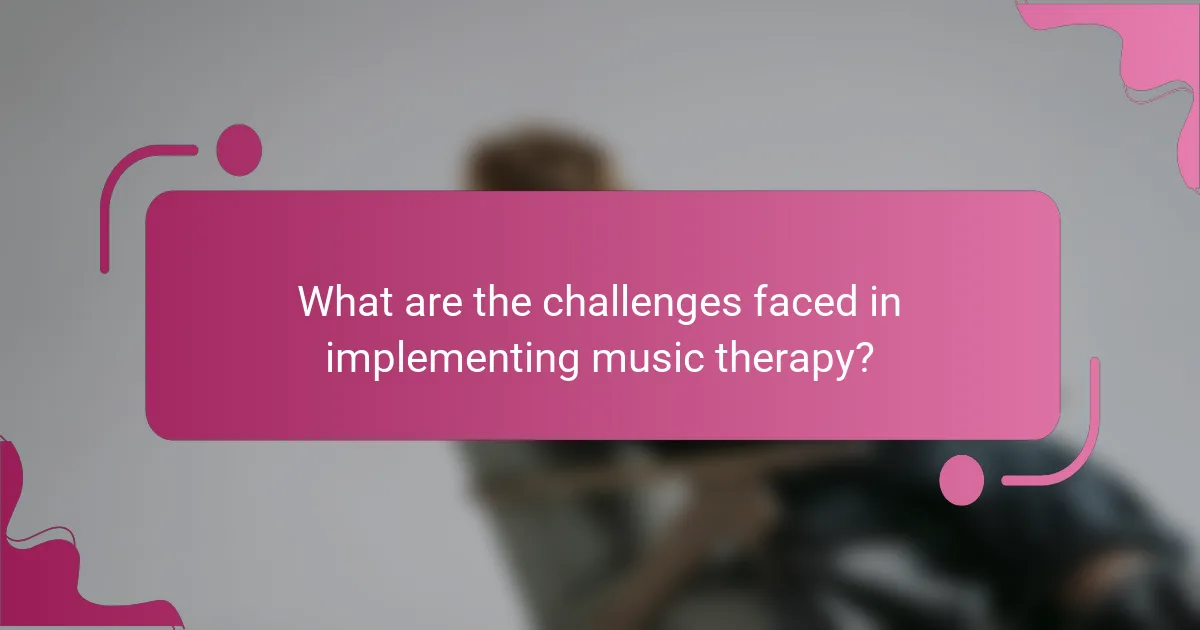
What are the challenges faced in implementing music therapy?
Implementing music therapy faces challenges such as limited access to trained professionals, varying patient responses, and insufficient funding. These factors hinder effective integration into healthcare systems. Additionally, misconceptions about music therapy’s efficacy can create resistance among healthcare providers. Ensuring consistent training and awareness about its benefits is essential for overcoming these obstacles.
How can practitioners overcome barriers to access?
Practitioners can overcome barriers to access by utilizing community partnerships, online resources, and flexible scheduling. Community partnerships can provide funding and outreach, increasing awareness of music therapy’s benefits. Online resources, such as teletherapy, expand access for individuals unable to attend in-person sessions. Flexible scheduling accommodates diverse client needs, enhancing participation. Engaging with local organizations can also foster support networks, further improving access to music therapy services.
What are the misconceptions about music therapy?
Many misconceptions exist about music therapy, often leading to its undervaluation. One common belief is that music therapy is merely about listening to music for relaxation. In reality, it involves structured interventions tailored to individual needs, promoting emotional healing and self-discovery. Another misconception is that music therapy is only effective for those with musical talent. In fact, its benefits extend to everyone, regardless of musical ability. Additionally, some think music therapy is a quick fix for mental health issues. However, it requires ongoing commitment and professional guidance for meaningful results.
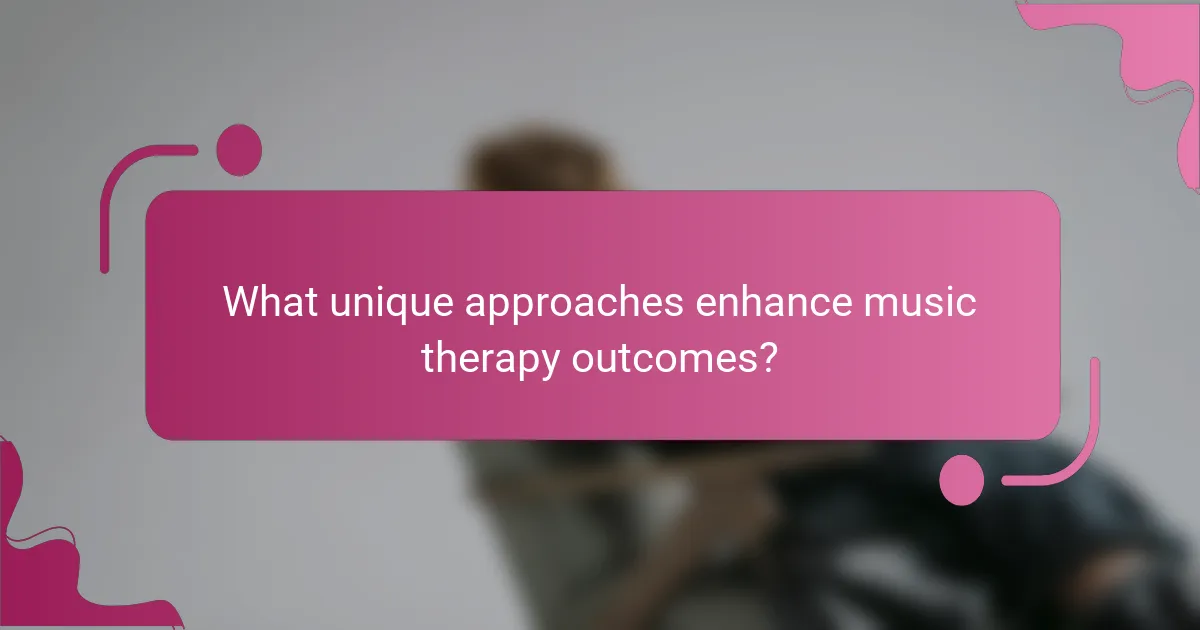
What unique approaches enhance music therapy outcomes?
Unique approaches that enhance music therapy outcomes include personalized interventions, integration of technology, and collaboration with other therapeutic modalities. Personalized interventions tailor sessions to individual needs, improving emotional connection and engagement. Technology, such as apps and virtual reality, offers innovative ways to deliver therapy and track progress. Collaboration with other therapies, like art or dance therapy, creates a holistic approach, addressing various aspects of healing. These strategies collectively improve emotional healing, stress relief, and self-discovery outcomes in music therapy.
How do individualized plans improve therapy effectiveness?
Individualized plans significantly enhance therapy effectiveness by tailoring interventions to each person’s unique needs. Music therapy applications benefit from this approach, addressing specific emotional challenges, stress levels, and personal growth. Customization allows therapists to select appropriate musical genres, instruments, and techniques that resonate with individuals, fostering deeper emotional connections. As a result, clients experience improved outcomes in emotional healing and self-discovery, making therapy more impactful and relevant to their lives.
Which collaborative techniques with other therapies yield the best results?
Collaborative techniques with other therapies, such as art therapy and mindfulness practices, yield enhanced results in music therapy applications. Integrating these methods can deepen emotional healing and promote stress relief. For example, combining music therapy with cognitive behavioral therapy can improve self-discovery and emotional regulation. Research indicates that such interdisciplinary approaches can lead to more significant therapeutic outcomes, fostering resilience and personal growth.
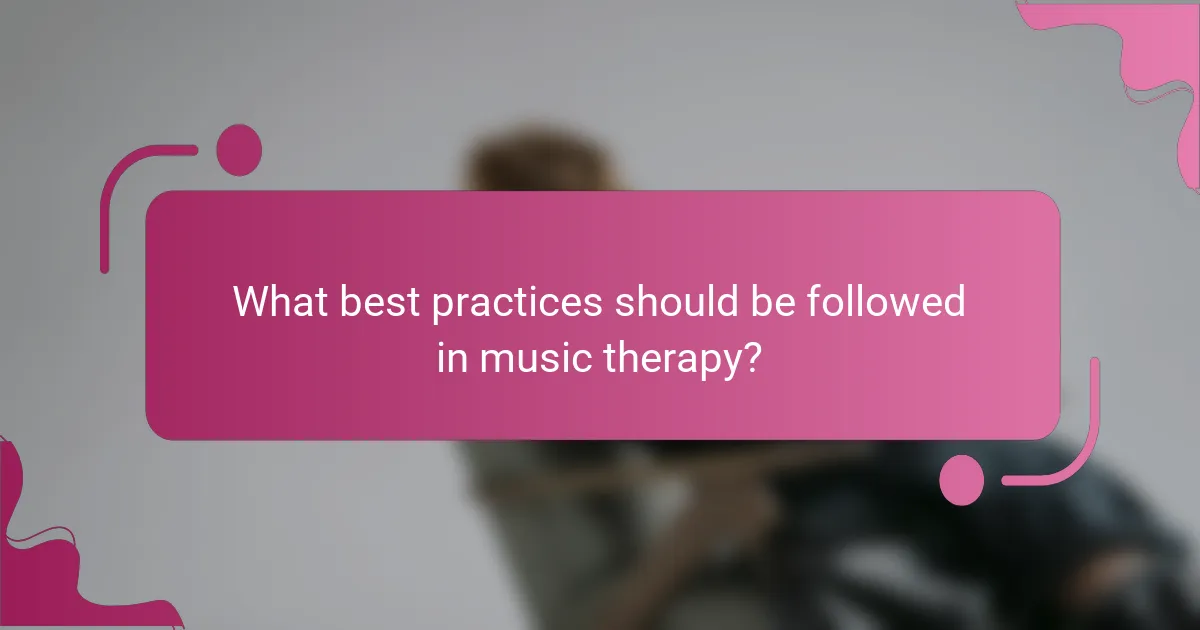
What best practices should be followed in music therapy?
To maximize the benefits of music therapy, practitioners should follow best practices that enhance emotional healing, stress relief, and self-discovery. Key practices include creating a safe environment, tailoring sessions to individual needs, and incorporating diverse musical styles.
Additionally, regular assessment of progress is essential to adapt techniques effectively. Engaging clients in active participation fosters a deeper connection to the therapeutic process. Collaboration with other healthcare professionals can also enrich the therapy experience, ensuring comprehensive care.
What common mistakes should practitioners avoid?
Practitioners should avoid the common mistakes of neglecting individual needs, overloading sessions with techniques, and failing to evaluate progress. Personalization is key; ignoring client preferences can hinder emotional healing. Balancing techniques prevents overwhelming clients. Regular assessments ensure effective self-discovery and stress relief.
How can clients maximize their benefits from music therapy?
Clients can maximize their benefits from music therapy by actively engaging in sessions, setting clear goals, and practicing techniques at home.
Active participation enhances emotional expression and connection to the therapeutic process. Setting specific goals allows clients to track progress and focus on desired outcomes. Practicing techniques outside of sessions reinforces skills and promotes self-discovery.
Additionally, clients should communicate openly with therapists about their experiences and preferences. This collaboration can tailor sessions to individual needs, maximizing emotional healing and stress relief.
Incorporating diverse musical genres can also enrich the experience, as different styles evoke various emotions and responses. This variety can deepen self-exploration and enhance the overall therapeutic journey.
